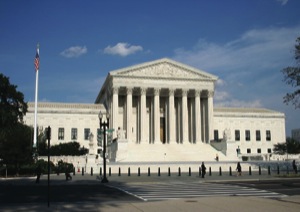
The past week in Congress was largely an exercise in theater, not governance. House Republicans used Department of Homeland Security funding as a proxy battle on immigration policy, while their 2016 presidential candidates raced stage right at the Conservative Political Action Conference. Democrats stared into the wings to see if Hillary was there yet. Both sides took a few minutes to weigh in on Israeli Prime Minister Netanyahu’s speech, hoping to find a way to keep Jewish donors while not disrespecting the president or at least the presidency. In a search for substance, we look to the courts, where important issues are being argued somewhat under the radar.
The Supreme Court started a busy week on Monday with oral arguments in Arizona State Legislature v. Arizona Independent Redistricting Commission. The case involves a ballot initiative from 2000 which gave an independent commission the power to draw congressional districts. This redistricting was previously done by state legislature, which is suing to get the power back. They argue the U.S. Constitution’s provision that the election of representatives is to be run by state legislature’s trumps the voter initiative.
Based on oral arguments, court watchers think Arizona’s Commission may be in trouble, as it leaves the legislature almost entirely out of the process. The survival of such commissions in other states, like California, may depend on whether the Court finds the concept itself unconstitutional or whether they can exist with a specified level of legislative involvement.
On Wednesday, the Supreme Court heard arguments in King v. Burwell, the latest challenge to the Affordable Care Act (ACA). This case hinges on phrasing that people who could not afford health insurance would be eligible for subsidies if they bought it on exchanges “established by the state.” Unfortunately, many states refused to set up their own exchanges, forcing the federal government to do so.
The Obama administration is arguing that the ACA as a whole makes it clear that there were not meant to be any real differences between federal and state established exchanges. The challengers say the language was intentionally used to encourage or even compel states to set up the exchanges, a reading of history that finds little support in the Congressional Record. As Covered California was set up by the state, we are not directly affected by the result, but we’re not entirely safe, either. Ending subsidies in the 34 states with federal exchanges could still cause millions to drop their insurance, forcing insurers to raise premiums nationwide.
Possibly on its way to the Supreme Court is Texas v. United States, in which U.S. District Judge Andrew Hanen ruled that President Obama’s 2014 immigration actions violate the Administrative Procedures Act. The administration put implementation on hold while they request a stay from Judge Hanen and an appeal from the Fifth Circuit. Should those not go the administration’s way, the Supreme Court would be next.
What about marriage equality? Oral arguments will likely be in late April, with a decision expected in June.











